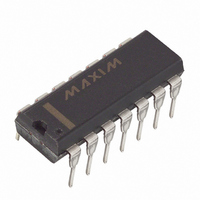DS1868-100+ Maxim Integrated Products, DS1868-100+ Datasheet - Page 5

DS1868-100+
Manufacturer Part Number
DS1868-100+
Description
IC POT DIGITAL DUAL 100K 14-DIP
Manufacturer
Maxim Integrated Products
Datasheet
1.DS1868-10.pdf
(14 pages)
Specifications of DS1868-100+
Taps
256
Resistance (ohms)
100K
Number Of Circuits
2
Temperature Coefficient
750 ppm/°C Typical
Memory Type
Volatile
Interface
3-Wire Serial
Voltage - Supply
2.7 V ~ 3.3 V, 4.5 V ~ 5.5 V
Operating Temperature
-40°C ~ 85°C
Mounting Type
Through Hole
Package / Case
14-DIP (0.300", 7.62mm)
Resistance In Ohms
100K
Lead Free Status / RoHS Status
Lead free / RoHS Compliant
DS1868
STACKED CONFIGURATION Figure 3
CASCADE OPERATION
A feature of the DS1868 is the ability to control multiple devices from a single processor. Multiple
DS1868s can be linked or daisy chained as shown in Figure 4. As a data bit is entered into the I/O shift
register of the DS1868 a bit will appear at the C
output after a minimum delay of 50 nanoseconds. The
OUT
stack select bit of the DS1868 will always be the first out the part at the beginning of a transaction. The
C
pin will always have the value of the stack select bit (b0) when
is inactive.
RST
OUT
CASCADING MULTIPLE DEVICES Figure 4
The C
output of the DS1868 can be used to drive the DQ input of another DS1868. When connecting
OUT
multiple devices, the total number of bits transmitted is always 17 times the number of DS1868s in the
daisy chain.
An optional feedback resistor can be placed between the C
terminal of the last device and the first
OUT
DS1868 DQ, input thus allowing the controlling processor to read, as well as, write data, or circularly
clock data through the daisy chain. The value of the feedback or isolation resistor should be in the range
from 2 to 10 kohms.
When reading data via the C
pin and isolation resistor, the DQ line is left floating by the reading
OUT
device. When
is driven high, bit 17 is present on the C
pin, which is fed back to the input DQ
RST
OUT
pin through the isolation resistor. When the CLK input transitions low to high, bit 17 is loaded into the
first position of the I/O shift register and bit 16 becomes present on C
and DQ of the next device. After
OUT
17 bits (or 17 times the number of DS1868s in the daisy chain), the data has shifted completely around
and back to its original position. When
transitions to the low state to end data transfer, the value (the
RST
same as before the read occurred) is loaded into the wiper-0, wiper-1, and stack select bit I/O register.
5 of 14













